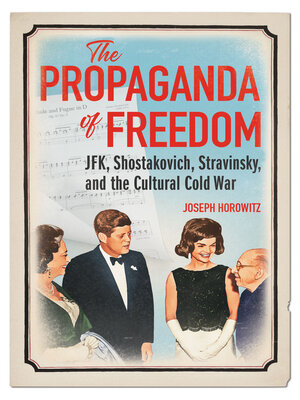The Propaganda of Freedom
ebook ∣ JFK, Shostakovich, Stravinsky, and the Cultural Cold War · Music in American Life
By Joseph Horowitz

Sign up to save your library
With an OverDrive account, you can save your favorite libraries for at-a-glance information about availability. Find out more about OverDrive accounts.
Find this title in Libby, the library reading app by OverDrive.



Search for a digital library with this title
Title found at these libraries:
| Library Name | Distance |
|---|---|
| Loading... |
Eloquently extolled by President John F. Kennedy, the idea that only artists in free societies can produce great art became a bedrock assumption of the Cold War. That this conviction defied centuries of historical evidence—to say nothing of achievements within the Soviet Union—failed to impact impregnable cultural Cold War doctrine.
Joseph Horowitz writes: "That so many fine minds could have cheapened freedom by over-praising it, turning it into a reductionist propaganda mantra, is one measure of the intellectual cost of the Cold War." He shows how the efforts of the CIA-funded Congress for Cultural Freedom were distorted by an anti-totalitarian "psychology of exile" traceable to its secretary general, the displaced Russian aristocrat/composer Nicolas Nabokov, and to Nabokov's hero Igor Stravinsky.
In counterpoint, Horowitz investigates personal, social, and political factors that actually shape the creative act. He here focuses on Stravinsky, who in Los Angeles experienced a "freedom not to matter," and Dmitri Shostakovich, who was both victim and beneficiary of Soviet cultural policies. He also takes a fresh look at cultural exchange and explores paradoxical similarities and differences framing the popularization of classical music in the Soviet Union and the United States. In closing, he assesses the Kennedy administration's arts advocacy initiatives and their pertinence to today's fraught American national identity.
Challenging long-entrenched myths, The Propaganda of Freedom newly explores the tangled relationship between the ideology of freedom and ideals of cultural achievement.
|ApologiaPreface: Why and What
Summing Up: Culture, the State, and the "Propaganda of Freedom"
Afterword: The Arts, National Purpose, and the Pandemic
Appendix A: Nicolas Nabokov, "The Case of Dmitri Shostakovitch" (1943)
Appendix B: President John F. Kennedy/Arthur Schlesinger, Jr., The Amherst Speech (1963)
Notes
Acknowledgments
Index
|"The Propaganda of Freedom makes a significant contribution to our understanding of the Cold War. The thesis that an ideology of 'freedom' made it impossible for leading American intellectuals to recognize the cultural achievements of Soviet artists during the Cold War is compelling and convincing—even for readers unversed in the cultural or musical history of the twentieth century. Moreover, it exposes one of the weaknesses of an omnipresent American world view: the fallible notion that, by virtue of its devotion to individual liberty, the United States surpasses the rest of the world in its ability to nurture artistic, scientific, and cultural achievement. In fact, all too often American foreign policy is based on the false premise that promoting 'individual freedom' must remain at the heart of the nation's efforts to exert influence abroad."The book raises important questions not only about the efficacy of US foreign policy, but also about the relationship between culture and democracy, even about the nature of democracy itself —questions extremely pertinent in a world where populist political movements have called into question democratic...







